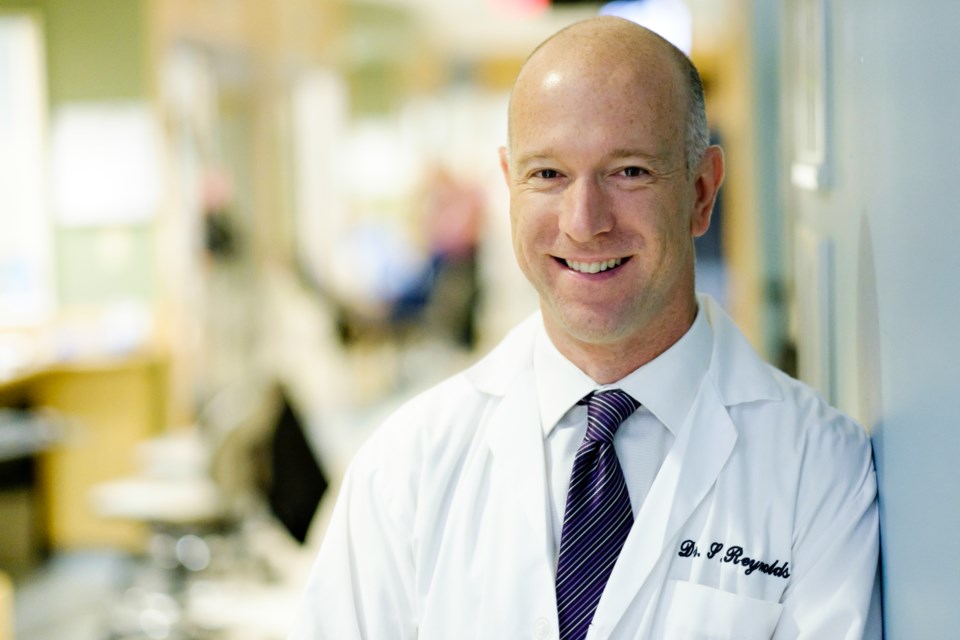A research team based out of Royal Columbian Hospital is leading a study that could change the way COVID-19 patients are treated around the globe.
Dr. Steve Reynolds, the hospital’s medical director and a critical care and infectious diseases specialist, is leading the team that will collect pulmonary and cardiovascular data from COVID-19 patients who are admitted to the intensive care unit at RCH.
Reynolds, in a media briefing held Thursday, April 16, said the global situation has made it challenging to conduct research into the virus, particularly in places such as Italy and Spain that have been hard hit by the pandemic. Reynolds noted British Columbia is in an excellent position to help in the research effort thanks to the more stable COVID-19 situation here.
“Although this is a worldwide disaster, in B.C. we’ve been blessed, I think, with great leadership, a very positive and helpful population with social distancing, and some luck as well,” he said. “And so our global duty as researchers is to take real advantage of that and to do systematic research so that we can help everyone; we can provide information for other folks to act on this.”
The study, which has been launched with a $150,000 contribution from the Royal Columbian Hospital Foundation, will begin by monitoring 10 COVID-19 patients in the local hospital’s ICU.
Reynolds, who is also a professor in critical care at Simon Fraser University, noted the study will allow his research team to use the non-invasive monitoring techniques they have developed in the lab over the past decade.
With those techniques, they’ll study the lung function of patients who are suffering from acute respiratory distress syndrome (ARDS) caused by COVID-19. They’ll measure how patients’ lungs respond to different levels of pressure from a ventilator, in order to maximize the effectiveness of the ventilation and to minimize the harm it can cause.
Reynolds described the use of a ventilator as a “double-edged sword.”
“It saves lives, and it is the foundation of the ICU, but particularly when the lungs are inflamed, it can cause ongoing injury,” he said.
This is an area of particular concern, he said, because doctors around the world have been observing that the lungs of COVID-19 patients aren’t responding in the same way as they would to infections such as viral pneumonia.
“Our regular way that we would manage these patients may not be optimal,” Reynolds noted.
He described the lungs’ alveoli (air sacs) as being like “millions and millions of tiny little balloons” that open and close. Often, when a patient is suffering from viral pneumonia or another bad infection, the lungs are quite stiff and require medical teams to dial in high pressures on the ventilator to keep the airways open.
With COVID-19, Reynolds said, the lungs don’t require nearly as much pressure. Too much ventilator pressure can cause injury to lungs and, in turn, affect heart function and even ultimately lead to multi-organ failure.
Monitoring pressure levels – and the resulting physiological responses – in real time will give the research team data they can use to determine how patients’ lungs are reacting to COVID-19 infection and how best to treat that infection.
Reynolds said the observational data gathered in the study will be collected as quickly as possible and will be given directly to the patients’ bedside clinicians every 12 hours so they can base their care decisions on the best possible data.
The data collected will also be published, along with observations of what clinicians did with that data and what happened as a result of those actions – information that can then be used by medical teams around the globe in their own COVID-19 care efforts.
“I’m not going to hold back any of that data,” Reynolds said. “That data is for everyone to have and to use.”
The study will also follow patients over time to create a timeline of the changes in patients’ lung functioning with an eye on improving medical care – and, ultimately, health outcomes – over time.
“I would like to say that I’ll come up with a magic bullet with this,” Reynolds said. “I’d love to, but I don’t think I’m going to. But what I’m excited about being able to do is to contribute to the global discussion around it and to be able to optimize the way that we use the tools we have.”
Jeff Norris, president and CEO of the Royal Columbia Hospital Foundation, said the foundation’s contribution to the study will be increased as needed over time.
He also noted that the foundation has received support from other hospital foundations for the effort – including Burnaby Hospital Foundation, which is allowing the team to use equipment.
Royal Columbian Hospital Foundation has set up a special COVID-19 response fund to help support the hospital’s frontline caregivers. See rchfoundation.com for details.



